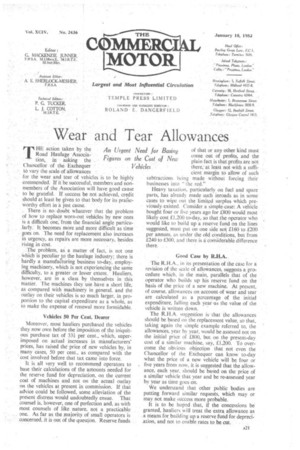Wear and Tear Allowances
Page 23

If you've noticed an error in this article please click here to report it so we can fix it.
THE action taken by the An Urgent Need for Basing Road Haulage Association, in asking the Figares on the Cost of New • Chancellor of the Exchequer Veh to vary the scale of :allowances for the wear and tear of vehicles is to be highly commended. If it be successful, members and nonmembers of the Association will have good cause to be grateful. If success be not• achieved, credit should at least be given to that body for its praise • wcirthY effort in a just cause.
There. is no.doubt whatever that the problem of how to replace worn-out vehicles by new ones is a difficult one, from the financial angle particu,larly. It becomes more and more difficult as time goes on. The need for replacement also increases in urgency, as repairs are more necessary, besides rising in cost.
The problem, as a matter of fact, is not one Which is peculiar to the haulage industry; there is hardly a manufacturing business to-day, employing machinery, which is not experiencing the same difficulty, to a greater or lesser extent. Hauliers, however, are in a class by themselves in 'this Matter. The machines they use have a short life, as compared With machinery in general, and the Outlay on their vehicles is so much larger, in proportion to the capital expenditure as a whole, as to make the expense of renewal more formidable.
Vehicles 50 Per Cult. Dearer Moreover, most hauliers purchased the vehicles they now own before the imposition of the iniquitous purchase tax of 331 per cent., which, superimposed on actual increases in manufacturers' prices, has raised the price of new vehicles by, in • many cases, 50 per cent., as compared with the cost involved before that tax came into force. It is all very well to recommend operators to base their calculations of the aniounts needed for the reserve fund for depreciation, on the current cost of machines and not on the actual outlay • on the vehicles at present in commission. If that advicecould be followed, some alleviation of the present distress would undoubtedly ensue. That counsel is, however, one of perfection and, as with most counsels of like .nature, not a practicable one. As far as the inajority of small operators is concerned, it is out of the questidn. Reserve funds of that or any other kind must comeout of • profits, and the plain fact is that profits are not there,' at least not with a sufficient .margin 'to. allow of such subtractions beim made -without forcing their businesses into the red." .
Heavy taxation, particularly on fuel and spare parts, has already made such inroads as in some cases. to wipe out the lithited. surplus which previously existed. Consider a simple-Case: A vehicle bought four or five years ago for-f800 would most likely cost £1,200 to-day, so that the operator who would like to build up a reserve. fund on the lines suggested, must put on .one side not £160 to £200 per annum, as under the old, conditions, but from £240 to £300. and there is a'CoriSiderable difference there.
Good Case by R.R.A., The R.H.A., in its presentation of the case for a revision of the scale of allowances, suggests a pro-. cedure which, in the main, parallels that of the operator who builds up. his reserve fund on the basis of the price of a new' machine. At present, of course, allowances on account.of wear and tear are calculated as a percentage of the initial expenditure, falling each year-as the value of the vehicle is 'written down.
The R.H.A. suggestion is that' he allowances should be based on the replacement value, so that, taking .again the simple example referred to, the allowances, year by year, would' be assessed not on the initial price of £800, but on the present-day. cost of a similar machine, say, £1,200. To overcome. the obvious objection that not even the Chancellor of the Exchequer can know to-day what the price of a new vehicle will be four or five years from now, it is suggested that the allowance, each year. should be based on the price of a similar vehicle that year and be re-assessed year by year as time goes on.
We understand that other public bodies are putting forward similar requests, which may or may not make success more probable.
. It is to be hoped that, if the concessions be granted, hauliers will treat the extra allowance as a means for building up a reserve fund for depreciation; and not to enable rates to be cut:




















































































